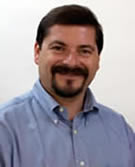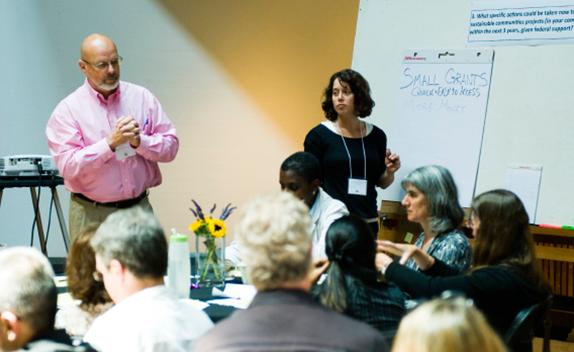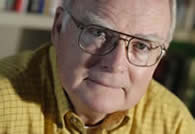The mission of the William D. Ruckelshaus Center is to act as a neutral resource for collaborative problem solving in Washington and the Pacific Northwest. The Center provides expertise to improve the quality and availability of voluntary collaborative approaches for policy development and multi-party dispute resolution. The Center is a joint effort of Washington’s two research universities. For more information, visit our website.
The William D. Ruckelshaus Center’s electronic newsletter (eNews) is published two to four times per year. If you know of someone who might be interested in receiving this eNews, please forward it to them. If you wish to be removed from the list or would like to subscribe, please email us.
Support the Center
Supporting the Center is a tax-deductible investment in the quality of life in our state and region. Donations are matched up to $100,000 per year by the Bill and Melinda Gates Foundation, and qualifies for donor credit at both WSU and UW.
Donate Now
 Center Names New Director
Center Names New Director
Michael Kern was named as the Center’s new Director in March 2010. Kern was selected from a national pool of candidates and has 20 years of experience helping diverse groups reach common ground on public policy issues in Washington and the Pacific Northwest.
Agriculture and Critical Areas (SSB 5248/6520)
 In 2007, Washington’s Governor and Legislature asked the Center to assist in resolving long-standing conflict over the application on agricultural lands of “critical areas” protections under Washington’s Growth Management Act.This conflict, more than a decade old, spawned lawsuits, appeals, legislative battles and a voter initiative. In Substitute Senate Bills 5248 and 6520, the Center was designated to coordinate fact-finding research and facilitate discussions among a multi-stakeholder committee intended to develop solutions, policies and practices that ensure protection of environmentally sensitive areas in ways that support the preservation of farm lands and a strong farm economy. The project reached an important milestone in October, when the Center provided a final report containing the Agriculture and Critical Areas Committee’s framework for a stewardship program intended to meet the goals of the legislation.
In 2007, Washington’s Governor and Legislature asked the Center to assist in resolving long-standing conflict over the application on agricultural lands of “critical areas” protections under Washington’s Growth Management Act.This conflict, more than a decade old, spawned lawsuits, appeals, legislative battles and a voter initiative. In Substitute Senate Bills 5248 and 6520, the Center was designated to coordinate fact-finding research and facilitate discussions among a multi-stakeholder committee intended to develop solutions, policies and practices that ensure protection of environmentally sensitive areas in ways that support the preservation of farm lands and a strong farm economy. The project reached an important milestone in October, when the Center provided a final report containing the Agriculture and Critical Areas Committee’s framework for a stewardship program intended to meet the goals of the legislation.
 Surplus Salmon
Surplus Salmon
The Washington State Legislature included in its 2010 budget a proviso directing the Washington State Department of Fish and Wildlife (WDFW) to “work with appropriate stakeholders to facilitate the disposition of salmon (at hatcheries) to best utilize the resource, increase revenues to regional fisheries to food banks.” The proviso instructs WDFW to provide a report summarizing the resulting discussions, outcomes and recommendations before awarding a new disposal contract. WDFW asked the Center to provide services to support stakeholder engagement and the development of recommendations including an economic analysis, an interview-based situation assessment, recommendations for a stakeholder involvement process, and facilitation of meetings between WDFW and appropriate stakeholders.
More information
 NW Marine Trade Association (NMTA)/Puget Soundkeepers Alliance (PSA)
NW Marine Trade Association (NMTA)/Puget Soundkeepers Alliance (PSA)
The Center is conducting this short-term project to put an important collaboration relationship back on track. In 2007, NMTA, PSA and the Washington State Department of Ecology signed an agreement describing how they would work together to address concerns over water pollution from bottom paint and other sources at boatyards. In December 2009, PSA–frustrated with what they saw as an unacceptably slow pace of implementation–filed a notice of intent to sue NMTA member boatyards for alleged violations of the Clean Water Act relating to these issues. NMTA suggested–and PSA agreed–that the Center become involved to help the parties resolve their dispute. The Center has facilitated several meetings at which the parties agreed to a series of steps aimed at repairing their working alliance. NMTA and PSA are again working cooperatively, and have thanked the Center for its assistance.
 Partnership for Sustainable Communities
Partnership for Sustainable Communities
The Center has been working with the National Policy Consensus Center (NPCC) at Portland State University to provide support to the Northwest regional offices of three agencies (Environmental Protection Agency, Department of Housing and Urban Development, and Department of Transportation) that have launched the Partnership for Sustainable Communities. The Partnership is an agreement to coordinate federal housing, transportation and environmental investments, policies, programs and resources to build more sustainable urban, suburban and rural communities. Building on an Oregon Community Dialogue hosted by Oregon State University and facilitated a Washington Community Dialogue. This session was hosted by the University of Washington’s Runstad Center for Real Estate Studies and brought together approximately 150 people from across Washington state working on housing, transportation and environmental issues in the federal, state, tribal, local private, NGO, academic and other sectors to discuss barriers, opportunities, actions and funding.
 Bill Ruckelshaus Moderates a Panel at the US Institute for Environmental Conflict Resolution Conference
Bill Ruckelshaus Moderates a Panel at the US Institute for Environmental Conflict Resolution Conference
The US Institute for Environmental Conflict Resolution (ECR), part of the University of Arizona’s Morris K. Udall Foundation, was created by Congress in 1998 and sponsors a conference every other year that brings together the members of its roster of ECR professionals (which includes Center Director Michael Kern) and others interested in ERC. It is the flagship conference of the field. The conference’s three themes this year included: 1) Policy Challenges of the Next Decade and the Role of ECR; 2) Engaging Federal-Tribal-State-Local Governments; and 3) New Tools and Technologies and their Application to ECR. Bill Ruckelshaus helped attendees focus on the first theme by moderating an opening plenary session among senior government officials on 40 years of implementing the National Environmental Policy Act (NEPA). Michael Kern served on a panel presenting case studies using ECR in the legislative arena.
Remember the Center in Your Year-End Giving
On behalf of the Ruckelshaus Center Development Committee Co-Chairs Anne Farrell and Bob Drewel, I would like to encourage you to include the Ruckelshaus Center in your year-end giving. Through its Advisory Board and other forums, the Ruckelshaus Center provides a venue for community leaders from across geographic, political and other sectors to interact with university leaders, policy makers, faculty, staff and each other, to identify opportunities for making progress on important issues. The Center responds by assembling teams from the Universities to provide applied research, fact-finding, facilitation, mediation, project management, training and other services that help make collaborative approaches possible.
The Center takes its vision from that of its founder and Advisory Board Chair, William D. Ruckelshaus, and strives to maintain a level of focus and clarity that matches his own. For us, it’s all about promoting and preserving the quality of life in our treasured part of the world by fostering collaborative solutions that are more satisfying and longer-lasting. We hope you will join us in that effort.
Philanthropy is critical to the Center’s work. Gifts from individuals and organizations provide the financial independence that reinforces the Center’s neutrality and ability to quickly respond to areas of need. You can donate online.
![]()